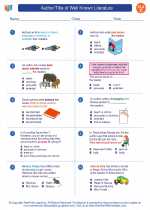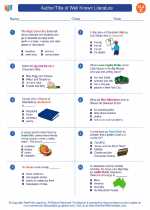Science Fiction Study Guide
Science fiction is a genre of literature that explores the impact of scientific and technological developments on individuals and societies. It often takes place in the future or in alternative realities, and it frequently involves speculative and imaginative elements.
Key Elements of Science Fiction
- Imaginative Settings: Science fiction stories often take place in futuristic or otherworldly settings, allowing for exploration of new technologies, societies, and environments.
- Advanced Technology: Science fiction frequently features advanced or speculative technologies, which may have significant impact on the story and its characters.
- Exploration of Science and Ethics: Science fiction often delves into scientific concepts and their ethical implications, encouraging readers to consider the potential consequences of scientific advancements.
- Speculative and Predictive Elements: Science fiction may speculate on potential future developments in science, technology, and society, offering commentary on current issues through the lens of the future.
- Alien or Otherworldly Life Forms: Many science fiction stories include encounters with alien beings or other forms of life beyond Earth, allowing for exploration of the unknown and the implications of such encounters.
Notable Science Fiction Authors
Several authors have made significant contributions to the science fiction genre, including:
- Isaac Asimov
- Arthur C. Clarke
- Ursula K. Le Guin
- Philip K. Dick
- Octavia Butler
Recommended Science Fiction Books
If you're interested in exploring science fiction further, consider reading these classic and contemporary works:
- Dune by Frank Herbert
- Neuromancer by William Gibson
- The Left Hand of Darkness by Ursula K. Le Guin
- Kindred by Octavia Butler
Remember, science fiction offers a unique opportunity to explore the intersection of science, technology, and human experience, and to consider the potential impact of future developments on our world.
[Science Fiction] Related Worksheets and Study Guides:
.◂English Language Arts Worksheets and Study Guides Third Grade. Author/Title of Well Known Literature
Worksheet/Answer key Author/Title of Well Known Literature
Author/Title of Well Known Literature  Worksheet/Answer key
Worksheet/Answer key Author/Title of Well Known Literature
Author/Title of Well Known Literature  Worksheet/Answer key
Worksheet/Answer key Author/Title of Well Known Literature
Author/Title of Well Known Literature 

 Worksheet/Answer key
Worksheet/Answer key
 Worksheet/Answer key
Worksheet/Answer key

The resources above cover the following skills:
Reading for All Purposes
Strategies are needed to make meaning of various types of literary genres. Students can:
Use Integration of Knowledge and Ideas to:
Compare and contrast the themes, settings, and plots of stories written by the same author about the same or similar characters (e.g., in books from a series). (CCSS: RL.3.9)